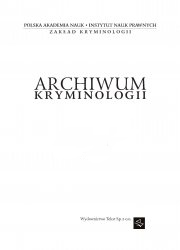How neoclassical criminology, penal populism and COVID-19 helped to escalate the repressiveness of criminal law - the case of Poland
How neoclassical criminology, penal populism and COVID-19 helped to escalate the repressiveness of criminal law - the case of Poland
Author(s): Dagmara Woźniakowska-Fajst, Katarzyna Witkowska-RozparaSubject(s): Criminal Law, Criminology, Penal Policy, Sociology of Law
Published by: Instytut Nauk Prawnych PAN
Keywords: neoclassical criminology; penal populism; repression; retributivism; penalty; pandemic; COVID-19;
Summary/Abstract: Since almost the very beginning of the 21st century, the prevalent criminal policy in Poland has been punitive, seeking to solve almost all problems related to crime by means of one solution, i.e. more severe penalties. At the same time, for more than 20 years political power has been wielded by conservative parties. It will come as no surprise that neoclassical criminology, with its retributive approach to punishment and repeated invocation of a social sense of justice, appeals most to a conservative government. Neoclassical criminology is also a good starting point for creating a penal offer typical of penal populism. In this article we analyse the latest changes in law related to the amendment of the Penal Code in June 2019. Although the amendment did not enter into force, it triggered operations aimed at tightening criminal law, with some of the changes proposed in the amendment adopted with the introduction of anti-crisis acts related to the COVID-19 pandemic.
Journal: Archiwum Kryminologii
- Issue Year: 1/2022
- Issue No: XLIV
- Page Range: 77-106
- Page Count: 30
- Language: English

